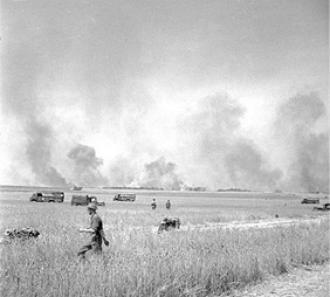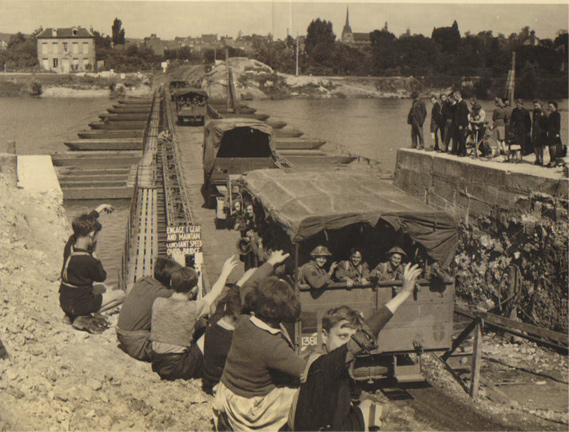The Breakout
August 1944

Operation Totalise
show infoDescription:
Smoke on the horizon. Men walking through fields in Normandy, France, during Operation Totalise August 1944.
Tags:
August 1944
The 51st Highland Division was relieved in place on 31st July and moved to North West of Caen to refit and rest.
The next phase of the campaign would be to achieve the breakout from the bridgehead. 8 and 30 Corps would drive east to take Vire and Mount Pincon. The 2nd British Army was to take Argentan and the Canadian Army Falaise The breakout battle began in the west on 30th July. The successes in this area, coupled with the weakening of the Germans further east as they shifted forces to meet the attack, allowed Montgomery to order the Canadian Corps to strike out towards Falaise. The operation was called Op Totalise. For Operation Totalise the 51st Highland Division was placed under command of the Canadian Corps.
The 51st Highland Division was placed under command of the Canadian Corps and on 6th August moved forward to begin the operation called Operation Totalise. The attack began on the night of the 7th August and when the operation ended on the 10th August the 51st Highland Division had secured all its objectives.
Extract from 5th/7th Gordons War Diary, August 1944. Detailing Operation Totalise in Normandy.

Crossing the River Seine
show infoDescription:
Children wave as lorries of 51st Highland Division cross the Seine on a pontoon bridge at Elbeuf, 2 September 1944.
Copyright:
Imperial War Museum - BU 1516
Tags:
Subsequent Operations
Once the initial objectives were secure, the Division turned east and crossed the River Dives and pressed on towards the River Vie. On the 18th August 153 Brigade forced a bridgehead over the Vie at Grandchamp (an extract for the 5/7th Gordons war diary describes the breakout and the action at Grandchamp) and 154 Brigade further south at St.Julien-le-Fancon. 152 Brigade exploited and on the 22nd August Lisieux fell to 153 Brigade.
The occupation of Lisieux brought the breakout to an end. The Division had fought without break since the 7th August.
The Canadian Commander sent the following message to General Rennie:
"Please congratulate Highland Division on fine aggressive work. The 51st of this war is showing the same unbeatable sprit which the Canadians got to know and admire in 1918"
